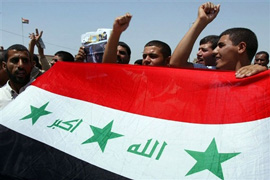Iraq presses US for pullout date
Baghdad says no deal on US forces staying in country unless exit date set.

In a meeting with Arab ambassadors in the United Arab Emirates on Monday, Nuri al-Maliki said Iraq had proposed a short-term interim memorandum of agreement rather than the more formal status of forces agreement the two sides have been negotiating.
“Negotiations are ongoing with the US side and the current attitude is to reach a memorandum of understanding either for immediate US forces withdrawal or timetable withdrawal,” he said on Monday.
But the US state department rejected a demand for a “hard date”, saying any withdrawal would be based on conditions on the ground.
“The US government and the government of Iraq are in agreement that we, the US government, we want to withdraw, we will withdraw. However, that decision will be conditions-based,” Gonzalo Gallegos, a state department spokesman, said.
“We’re looking at conditions, not calendars here,” he said.
Downplaying differences
But the White House downplayed differences between Washington and Baghdad on Tuesday, saying that it was still aiming to reach agreement with Iraq this month on the presence of US troops there.
 |
| The proposal may help Iraqi officials sell the military deal to the public [AFP] |
Scott Stanzel, a White House spokesman, said the goal remained the achievement of a deal with the Iraqi government by the end of the month, despite Baghdad’s demand for a departure date.
Al-Rubaie on Tuesday told reporters that the two sides were discussing dates for US-led forces to withdraw, contradicting Stanzel’s Monday statement that the US was not negotiating a “hard date” for troops to leave.
But Stanzel suggested that the hurdles were not as large as they seemed.
“The people participating in the negotiations are all in agreement that we want the Iraqis to take over greater responsibility for the security of their country so American troops can come home,” he said.
“There is also agreement among the negotiators that those decisions will be based on conditions on the ground,” he added.
“The Iraqis certainly don’t want to give up the hard-fought security gains which have been made in their country and neither do we.”
US troops ‘still needed’
But while Iraq’s security forces are becoming increasingly independent, US aid for Iraq’s army and police units will be needed for an undetermined amount of time, a senior US army general was due to tell congress on Wednesday.
In written remarks prepared for a House Armed Services Committee hearing, Lieutenant-General James Dubik said the size of Iraq’s forces had grown by more than a quarter in the past year, from 444,000 to 566,000.
They were also improving their ability to execute operations on their own, but still lacked experienced military leaders and had yet to become proficient at training new recruits, Dubik’s prepared remarks said.
Dubik led the Multi-National Security Transition Command in Iraq until last week.
Some type of agreement is needed to keep US troops in Iraq after a UN mandate expires at year’s end.
But many Iraqi legislators have criticised the government’s attempt to negotiate a formal status of forces agreement, worried that US demands would threaten the country’s sovereignty.
Elbow room
Ali al-Adeeb, an Iraqi legislator and prominent official in the prime minister’s party, told The Associated Press that Iraq was linking the timetable proposal to the ongoing handover of various provinces to Iraqi control.
The Iraqi proposal stipulates that, once Iraqi forces have resumed security responsibility in all 18 of Iraq’s provinces, US-led forces would then withdraw from all cities in the country.
After that, the country’s security situation would be reviewed every six months, for three to five years, to decide when US-led troops would pull out entirely, al-Adeeb said.
So far, the US has handed control of nine of 18 provinces to Iraqi officials.
The proposal, as outlined by al-Adeeb, is phrased in a way that would allow Iraqi officials to tell the Iraqi public or parliament that it includes a specific timetable and dates for a US withdrawal.
However, it also would provide the US some flexibility on timing because the dates of the provincial handovers are not set.